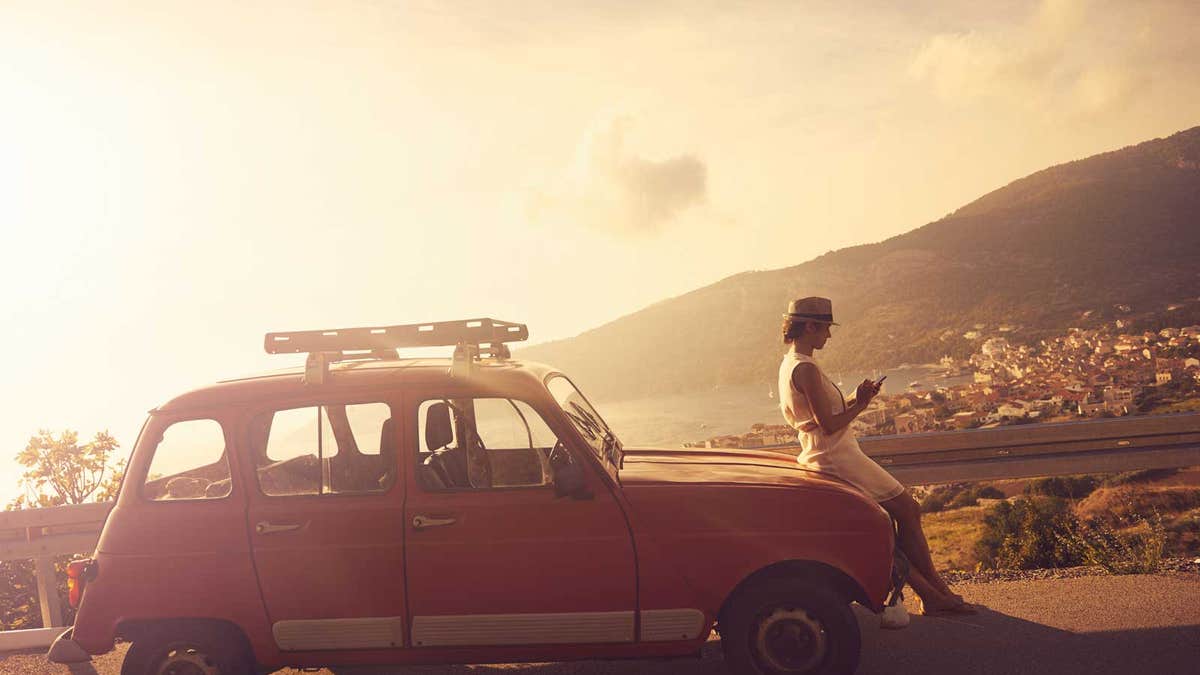
(pixdeluxe)
There's nothing worse than packing up the car and hitting the road for a long trip and then realizing you left something at home or discovering that your key fob battery has died halfway to your destination. Avoid unnecessary pit stops by checking this list before getting behind the wheel.
1. According to the AAA, most breakdowns can be prevented by having your car serviced before your journey. Head to a mechanic at least a week in advance to have the oil and tire pressure checked and ensure that the battery, brakes, and engine are working properly.
2. While a growing number of new cars come with inflation kits, most still don't have spare tires, including rental cars. If you have a run-flat or doughnut tire, remember that those are intended for short-term use until the flat tire can be fully repaired or replaced. Consider investing in a spare-tire kit, which includes a tire, jack, and lug wrench,
for $150 to $300.
3. Pack an emergency kit that has distilled water, a battery charger, a first-aid kit, jumper cables, and flares or reflectors. Learn how to use the jumper cables before getting on the road. Look for video tutorials on YouTube.
More From Travel + Leisure
4. Secure rooftop cargo with a storage box. Packasport makes a variety of sizes and can also customize a hard-shell case for your vehicle. from $999.
5. Bring an extra battery for your key fob. "You'd be surprised at how many car keys die when people are on the road, leaving them locked out of their cars," says AAA spokesperson Mariam Ali. In 2015, AAA rescued more than 4 million drivers
with dead key batteries.
6. If you're traveling on a major interstate highway, use the iExit app to get the lowdown on amenities at upcoming exits, including gas stations, grocery stores, hotels, and hospitals, as well as local attractions.
7. Have a reusable glass or stainless-steel water bottle for each person in the car and refill it along the way. Dehydration can lead to headaches and crankiness.
8. Packing and repacking your car can be time consuming. Road-trip expert Tamela Rich, the author of three books, advises loading nonessential items first, such as anything you won't need until your reach your final destination, and then put in items that you'll rely on throughout the drive, such as a camera or a purse.
9. For multicity car trips, pack an overnight bag that's separate from your luggage and fill it with daily essentials, such as pajamas and toiletries. "This saves you from dragging bulky luggage in and out of the car every time you check in to a hotel," Rich says.
10. Pack a bag with wet wipes, paper towels, hand sanitizer, and trash bags to deal with accidents or messes.
11. Bring along an instant camera. Then use the snapshots to create a scrapbook of your adventures. The smallness of the Instax Mini 8 by Fujifilm makes it handy to tote along on road trips. amazon.com; $57
12. Be prepared for unexpected tolls by bringing extra $1 and $5 bills for booths that don't have electronic toll collection, or in case EZ-Pass or FasTrak doesn't work on your route. Also fill old pill bottles with quarters for easy counting at tollbooths or for parking meters. The Parkmobile app, which helps make parking-fee payment simpler, is now being used in 36 major U.S. cities.
13. Pack a cooler of non-messy, healthy snacks such as baby carrots, apples, grapes, boiled eggs, and nuts. The protein and fiber in foods like these, Rich says, help stabilize blood-sugar levels and digestion, which can be thrown off during travel.
14. Clean bathrooms definitely make your pit stops more pleasant. For restrooms on your route that you can use without fear, check out sitorsquat.com, diaroogle.com, or the Bathroom Scout app.
15. Farmers' markets are gold mines for picking up prepared regional specialties, Rich says, such as Native American fry bread in New Mexico or barbecued pork in the Carolinas. Check out ams.usda.gov for market schedules across the country.
16. Don't miss out on popular culinary hot spots along your route. TVFoodMaps.com has curated a list of more than 4,000 restaurants that have been featured on popular television shows such as Diners, Drive-Ins and Dives. Roadfood.com lists hundreds of authentic, locally owned restaurants, which are usually a better option than fast-food chains.
17. Don't have any place in your car to put your cell phone to view your maps app? Use a binder clip and a rubber band to make your own phone holder to clip onto air vents.
18. Not enough outlets to charge devices for all passengers? Get a multi-outlet adapter, such as the Anker 48W 4-Port USB Car Charger. walmart.com; $17.
19. Consider using dryer sheets instead of a standard car air freshener, which can be pretty intense. Tie them to the sun visor instead of dangling them from the rear-view mirror, which can obstruct the driver's sight lines.
20. Kendra Thornton, president of Royal Travel & Tours travel agency, advises breaking up long car drives by stopping every two to three hours, whether for a meal, to check out an attraction, or at a rest stop to stretch your legs. "When you take frequent breaks, the trip feels like a series of manageable drives instead of one interminable one," she says.
21. Passengers should take turns driving. And remember, neck pillows aren't just for airplanes. Drivers can use them to
nap between shifts.







































